Añadir el sistema de comentarios Disqus es una gran manera de superar las limitaciones del sistema de comentarios por defecto de WordPress.
El motivo es el siguiente: la gestión de comentarios en un sitio de WordPress puede resultar abrumadora, sobre todo si el spam obstruye el panel de control. Aunque el sistema por defecto funciona, carece de herramientas avanzadas de moderación y de funciones interactivas que promuevan una participación significativa.
Disqus es una de las plataformas de comentarios más populares, que ofrece una interfaz elegante, discusiones por hilos y opciones de inicio de sesión en redes sociales.
Y en esta guía, le mostraremos una manera fácil de añadir Disqus a su sitio de WordPress.
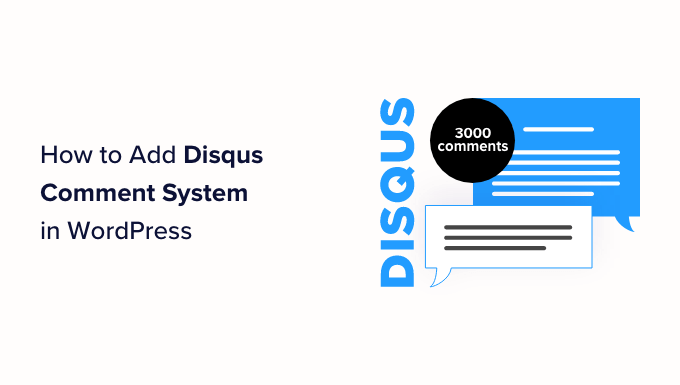
¿Debería usar Disqus con WordPress?
Disqus es uno de los sistemas de comentarios de terceros más populares entre los usuarios de WordPress. Aparte de su facilidad de uso y opciones de personalización, también ofrece una plataforma de alojamiento de terceros para almacenar y gestionar comentarios.
Dado que Disqus gestiona los comentarios en un servidor independiente de tu alojamiento WordPress, su uso puede ayudar al rendimiento general de tu sitio web. Por eso muchos usuarios de WordPress lo utilizan como alternativa al sistema de comentarios por defecto de WordPress.
Dicho esto, Disqus no es el mejor sistema de comentarios que hemos probado. Aunque ayudó al rendimiento de nuestro sitio web, no nos gustó su capacidad de moderación y añadió enlaces de afiliados a nuestro contenido sin nuestro permiso.
Después de desactivar Disqus, vimos que nuestra tasa / tarifa de participación en los comentarios aumentó significativamente. Puedes leer más acerca de nuestra experiencia en nuestra reseña / valoración de Disqus.
Por supuesto, si usted decide utilizar Disqus u otras plataformas depende de usted. Pero si usted está buscando alternativas Disqus, entonces tenemos algunas recomendaciones.
¿Qué sistema de comentarios de WordPress debe utilizar en lugar de Disqus?
Después de probar diferentes plugins de comentarios, hemos encontrado que Thrive Comments es la mejor alternativa a Disqus.
Thrive Comments es un plugin de comentarios todo en uno con una interfaz fácil de usar que es perfecta tanto para principiantes como para expertos en blogs. Para más detalles, puedes ver nuestra reseña de la suite Thrive Themes, que contiene una sección específica sobre Thrive Comments.

Además de las características de gestión y moderación de comentarios, puedes utilizar Thrive Comments para impulsar la participación de los usuarios con acciones posteriores al comentario. Después de que el usuario deje un comentario, puedes redirigirlo a entradas relacionadas o a un mensaje de agradecimiento personalizado con un regalo gratuito.
Además, puedes añadir “me gusta” y “no me gusta”, así como “upvotes” y “downvotes” para fomentar la interacción del público en tu sección de comentarios. Además, puedes enviar notificaciones a los comentaristas cuando su comentario reciba respuestas.
Si Thrive Comments no se adapta a tus necesidades, también puedes comprobar nuestro listado completo de los mejores plugins de WordPress para mejorar los comentarios.
Si todavía está interesado en utilizar Disqus, no se preocupe. Le explicaremos cómo añadir el plugin del sistema de comentarios Disqus. Puede utilizar los enlaces rápidos para omitir las diferentes secciones:
¡Adelante!
Paso 1: Crear una cuenta Disqus
El primer paso para instalar comentarios Disqus en WordPress es crear una cuenta Disqus. Para ello, tienes que ir al sitio web de Disqus(disqus.com) y registrarte.
Una vez que lo hayas hecho, deberías ver la siguiente página. Sigue adelante y haz clic en “Quiero instalar Disqus en mi sitio”.
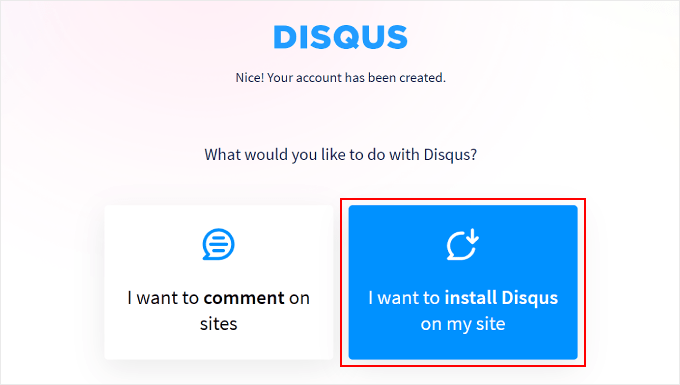
En la página siguiente, tendrá que añadir los datos de su nuevo sitio Disqus, que es donde gestionará todos sus comentarios Disqus. Estos incluyen Propietario del sitio, Nombre del sitio web y Categoría.
En el campo ‘Nombre del sitio web’, puede insertar el subdominio del sitio Disqus que desee. A continuación, haga clic en “Crear sitio”.
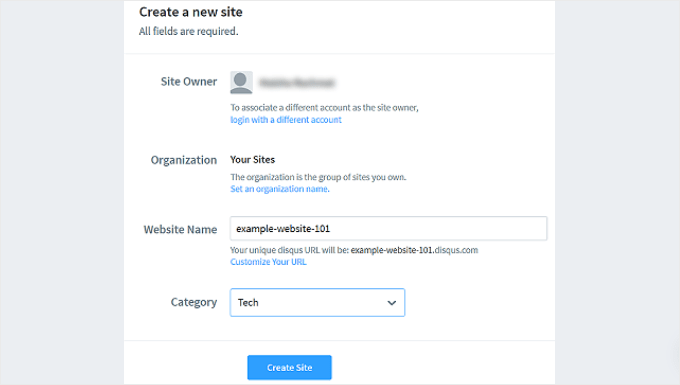
Llegará al Escritorio del sitio de Disqus.
En este punto, tendrá que elegir uno de los planes de Disqus para poder establecer el sistema de comentarios en WordPress. Si aún no estás seguro de cuál usar, puedes empezar con el plan básico gratuito.

Ahora se le pedirá que elija una plataforma.
Selecciona “WordPress” para continuar.
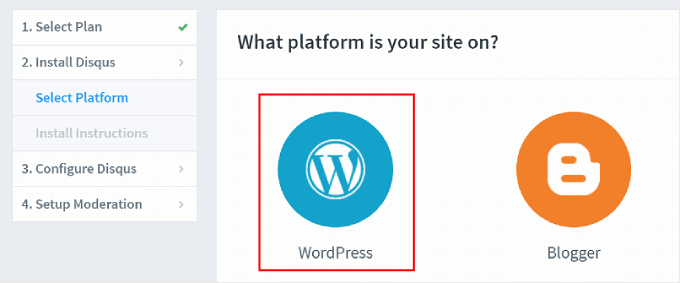
Ahora verá la página de instalación de WordPress.
Aquí, usted querrá tomar nota del campo “Token de Instalación”, que será útil para la configuración posterior.
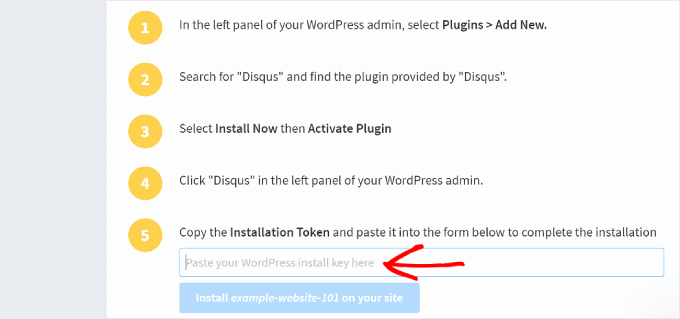
Puede dejar esta pestaña abierta mientras continúa con los pasos siguientes.
Paso 2: Instalar el plugin Disqus Comment System
Ahora, puede abrir su escritorio de WordPress para instalar el plugin Disqus Comment System. Para obtener instrucciones paso a paso, usted querrá comprobar nuestra guía sobre cómo instalar un plugin de WordPress.
Después, vamos al menú Disqus desde tu escritorio de WordPress. A continuación, en “¿Tienes una cuenta Disqus?”, haz clic en “Sí”.
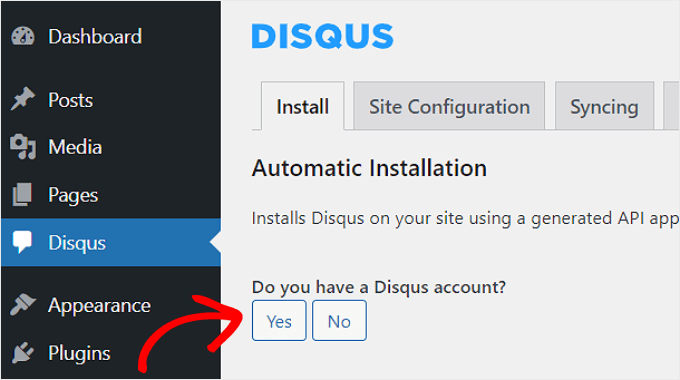
Ahora aparecerá la pregunta: “¿Tiene un sitio registrado en Disqus que desee utilizar?”.
Seleccione “Sí”.
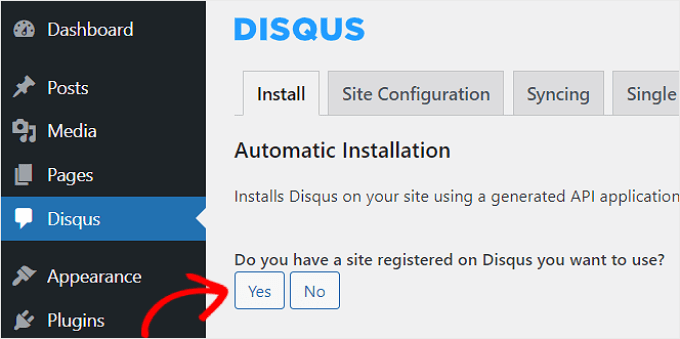
En este punto, verás algunas instrucciones de instalación de WordPress y un token de sincronización para copiar.
A continuación, haz clic en el botón “Copiar”.
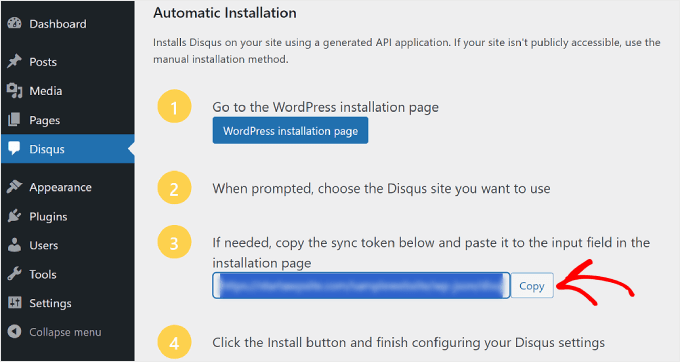
Volvamos ahora al sitio web de Disqus.
Aquí, tendrá que pegar el token que acaba de copiar del escritorio de WordPress en el campo correspondiente.
A continuación, pulsa el botón “Instalar [nombre del sitio Disqus] en tu sitio” y haz clic en “Configurar” en la parte inferior.
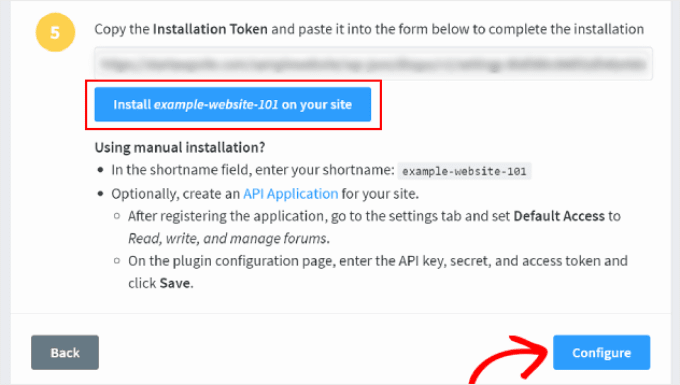
¡Y ya está!
Si actualiza el menú de Disqus en su escritorio de WordPress, debería ver una interfaz similar a esta:
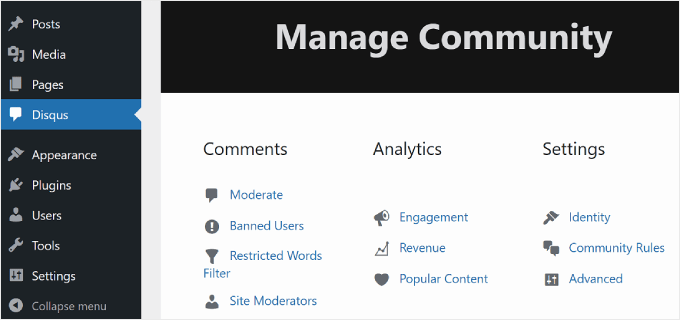
Ahora, vamos a ver si Disqus se ha activado / activado correctamente en su sección de comentarios.
Basta con abrir una entrada de un blog de WordPress en la interfaz y desplazarse hasta los comentarios. Este es el aspecto que debería tener si la instalación se ha realizado correctamente:
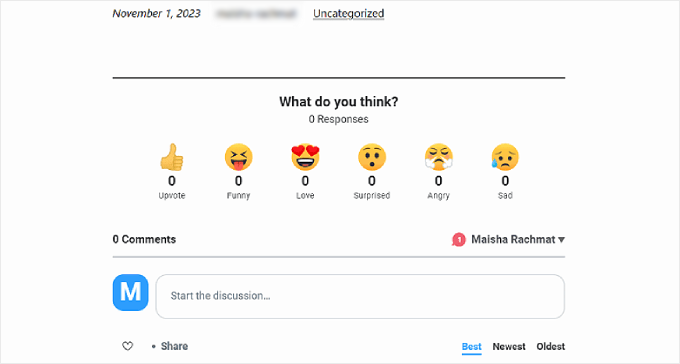
Paso 3: Importar y exportar comentarios antiguos de WordPress a Disqus
Una vez que haya instalado el sistema de comentarios Disqus, éste se hará cargo de los comentarios nativos de WordPress en su sitio. En otras palabras, los comentarios existentes almacenados en su sitio web de WordPress no serán visibles para los usuarios.
Para solucionarlo, tendrás que importar los comentarios existentes al sistema de comentarios Disqus. En el área de administración de WordPress, vaya a la página de configuración del plugin Disqus, desplácese hacia abajo y vaya a la pestaña “Sincronización”.
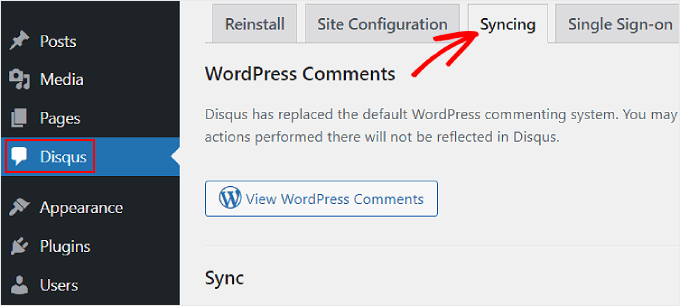
A continuación, desplácese hacia abajo y seleccione “Importar comentarios”.
En la tabla de la parte inferior verá cuáles de sus comentarios se han importado correctamente.
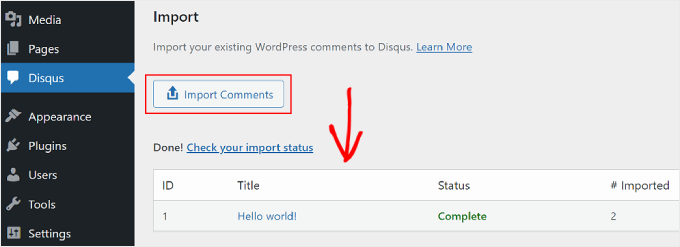
Una cosa a tener en cuenta es que si usted tiene tipos de post personalizados, entonces usted puede notar que sus comentarios más antiguos no aparecen después de cambiar a Disqus. Para solucionarlo, tendrás que desactivar Disqus en los tipos de entrada personalizados.
Para una guía práctica, puede consultar nuestro artículo sobre cómo desactivar Disqus en los tipos de entrada personalizados.
Cómo moderar y configurar los comentarios de Disqus
Si desea moderar los comentarios mediante Disqus, puede hacer clic en el botón “Moderar” de la página del plugin de Disqus.
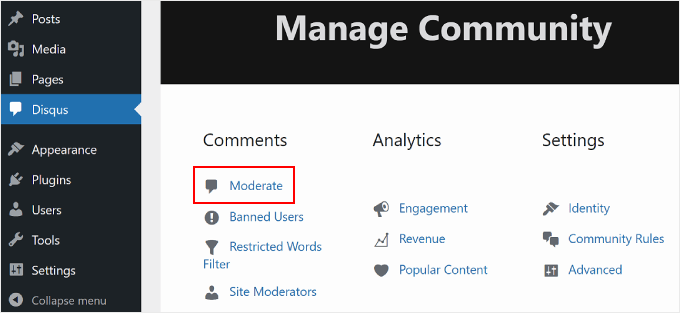
Esto le llevará a la página de moderación en el sitio web de Disqus.
Si estás familiarizado con la página de comentarios de WordPress, navegar por la de Disqus no te supondrá ningún problema. Aquí puedes aprobar, borrar o marcar comentarios como Spam.
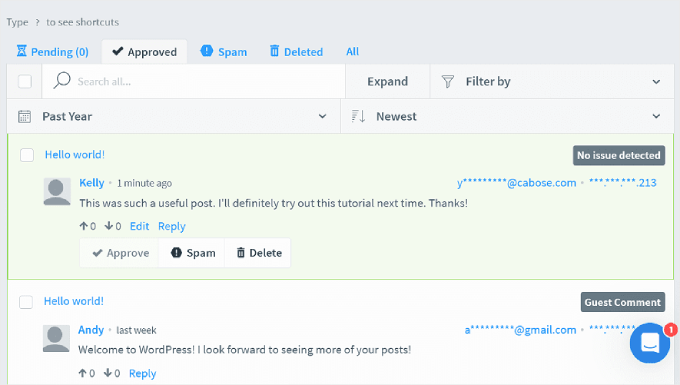
Para obtener consejos y trucos sobre la moderación de comentarios en WordPress, puede comprobar los siguientes artículos:
- Guía para principiantes sobre cómo moderar comentarios en WordPress
- Cómo permitir que los usuarios de un blog moderen los comentarios en WordPress
- Cómo permitir a los usuarios editar sus comentarios en WordPress
Cómo diagnosticar el problema de visualización de comentarios de Disqus
En algunos temas de WordPress, el área de comentarios de Disqus puede aparecer más ancha que el resto del área de entradas. Para corregirlo, tendrás que añadir CSS personalizado a la hoja de estilos de tu tema o tema hijo.
Aunque puedes añadir CSS personalizado a través del editor de archivos del tema, no te lo recomendamos. El seguimiento de los cambios se vuelve complicado, por lo que no está claro qué código es del tema y cuál es personalizado.
En su lugar, le sugerimos que utilice WPCode, que es el plugin de fragmentos de código más sencillo. Le permite añadir y gestionar de forma segura código personalizado en su sitio de WordPress. Si el código no funciona, puedes quitar / eliminar fácilmente el fragmento de código dentro del plugin.
A continuación encontrará el código que deberá añadir:
1 2 3 4 | #disqus_thread { margin: 0 auto; max-width: 650px;} |
Este CSS establece el ancho máximo del área de comentarios en 650px y lo centra en la pantalla. Tu tema puede tener un ancho diferente, por lo que tendrás que ajustarlo a tus necesidades.
Para un tutorial paso a paso, puede leer nuestra guía sobre cómo añadir fácilmente CSS personalizado a su sitio de WordPress.
Este es el aspecto que debería tener en WPCode:
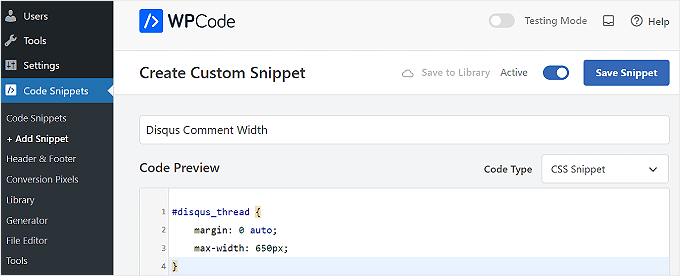
Más formas de gestionar tus comentarios en WordPress
Utilizar Disqus es sólo una forma de gestionar tus comentarios en WordPress. Aquí tienes más guías que puedes marcar / comprobar para mejorar la participación en tus comentarios:
- Cómo permitir que los usuarios informen de comentarios inapropiados en WordPress
- Cómo instalar y configurar los comentarios de Facebook en WordPress
- Cómo paginar comentarios en WordPress (paso a paso)
- Cómo añadir vídeos y más en los comentarios de WordPress con oEmbed
- Cómo permitir a los usuarios editar sus comentarios en WordPress
- Cómo dar estilo al formulario de comentarios de WordPress (Guía definitiva)
- Cómo enviar un correo electrónico de agradecimiento a los comentaristas de un blog en WordPress
Esperamos que este artículo te haya ayudado a aprender cómo añadir el sistema de comentarios Disqus en WordPress. También puedes consultar nuestra guía sobre cómo destacar o enterrar comentarios en WordPress y nuestra selección de los mejores plugins para mejorar los comentarios en WordPress.
If you liked this article, then please subscribe to our YouTube Channel for WordPress video tutorials. You can also find us on Twitter and Facebook.




Aaron Jane
Hello,
I’m getting lot of spams on my site with the default comment system, though I have akismet installed. Thought about using Disqus, but I see that Disqus is no longer used by wpbeginner. Can you share why you moved away from disqus ?
Thanks Aaron.
WPBeginner Support
Here is why we switched away from Disqus.
Admin
Theo
Thanks a whole lot for this post. I’ve decided to start using disqus for some of the same reasons you mentioned here. This was helpful!
Mohammed Haseeb
Okay. I know Disqus is good but I have a question. Is there a way to remove hyperlinks from profile names of people commenting on my blog posts. Here is the link to my blog
AlleXyS
Hello … I tried some days to activate disqus on my website. CAN’T , due of a issue in database…. I install disqus (plugin) => comments => disqus => tell me to upgrade my DATABASE !! I click UPGRADE, but nothing happening, my website tell me that this page can’t be found .. So, I think the script can’t run
here I can’t arrive : http://cdn2.wpbeginner.com/wp-content/uploads/2014/04/disqus-signin.png
WPBeginner Support
Please contact Disqus support they would be better able to help you with that.
Admin
WPBeginner Staff
Disqus.
Adjie Al-Faruq
how to fix “unable to connect to the disqus api servers”
Bora M. Deniz
Hi, very simple expression and useful article. I’m between jetpack plugin and disqus system .Which one is the more useful for visitors and further SEO of website ?
Santhosh Veer
when i try to import the worpdress comments i show error please help me to fix this
Andreia Franco
I have disqus on my blog for a couple of months, since then I just have received lots of spams and disqus doesn’t work at all. I see disqus on other wordpress blogs and it seem to work very well. I do not know what to do with mine. I always go back to moderate and try to activate it but it doesn’t work, still. Do you have any suggestions?
couture31
SOOO glad to have you all as a resource! I have transitioned to a self-hosted WP site and I visit your site daily for tips! Thanks for your help and patience…the step by step directions are awesome!! So grateful!
WPBeginner Staff
Edit the post and make sure comments are enabled for that post. Also go to Settings > Discussion and make sure that the box next to ‘Automatically close comments on articles older __ days’ is unchecked.
UgochukwuEmmanuelAgbams
Thanks for this tutorial. I have earlier registered on disqus, installed and activated the plugin, but ny problem now is, at the footer of my blog post after disqus, I have a report that says, ‘comments are closed’, and another issue is, disqus does not sync with my loged in users. What should I do about this?
Kerryvaaine
It is available as a plugin in wordpress.
Neal Umphred
My experience trying to get Disqus onto my site does not resemble anything like what you have written above. It’s an hour later and I can’t get anything happening . . .
Teresa Robeson
I sympathize because it is the same for me. There is no “plugins” link on my admin page, nor is there any option for adding Disqus (or anything else) under the Comments link. Maybe it’s because I’ve only got a free WP site, but I didn’t have this much trouble installing Disqus on my Blogger site. There are days I really hate WordPress.
I hope you got it figured out since you posted 2 weeks ago.
Dennis
I personally have used jetpack comments for comment on site to handle spam. Most persons I have noticed are usually uncommon with the disqus concepts and dislike the sign up process, very few notice the ‘guest’ option. But I’m looking into using Vanilla comments by integrating vanilla forums into my wordpress website and keep the comment actions completely under my control simples like a good option to me so far from testing.
Aaron Aarons
I don’t have my own blog but I regularly post comments to blogs that use Disqus. Quite frankly, there is so much I dislike about Disqus that I would never use it, without major future improvements, in a blog I had any control over.
1) Comments either don’t show up at all in Google searches on phrases within them, or they show up as part of the page of the particular commenter’s Disqus comments, rather than as part of the page they comment on.
2) If I save a web page that has Disqus comments, the comments are not saved with the page, and the ability to retrieve the comments depends on the future maintenance of such comment threads by Disqus.
3) I can save a page with comments as a PDF, but then the information about the precise date and time of a comment can no longer be seen even by a mouse-over (nor by looking at the non-existent source), so all one sees is how many days, weeks, months or years before the time the page was saved the comment was posted. This makes it impossible to follow the chronology of a discussion.
4) In one case, a blogger lost his domain name and had to get a new, different one. Since then, the old pages can be accessed with the new domain name, but the old comments do not show. There is a way to get to the original comment thread, but it’s not accessible to the casual user.
There are other, less serious, annoyances, that have slipped my mind for the moment.
If I am wrong about any of the items I had listed as problems above, I’d like to know.
Earl Henson
I wonder if Google traffic is lower than it would be if comments don’t show in Google? And of course comments would be the same with Disqus but wouldn’t they become higher over time as more people discover this blog? But if NEW users can’t discover this blog because the comments are not Google searchable…..
Codex73
Recently installed “Disqus Comment System” WordPress plugin, it displays correctly and accepts comments. When I reply through the Dashboard, these won’t show on thread. Should replies be handled directly in the Disqus thread instead?
Bricky
Is there a way to display a number in front of each comment using disqus?
Metal Mofos
What about SEO?
Dave
Even with Disqus, the comments are fully indexed along with the page. Do a View Source of this page to see for yourself.
Rob Orr
That’s not necessarily true. It’s possible that Google will index your comments, but I’ve seen many more that are not indexed as opposed to those that are.
WPBeginner Staff
We wrote about this plugin in our guide on how to add Google+ comments in WordPress.
Animish
Thanks for this useful article. But there is one question stuck in my mind. Does Disqus affect the load time of posts? Because it uses iframe to load comments. Didi you notice any difference?
Jeanz
Hello Syed. What you think about this plugin? – WordPress Comments Evolved – that allow to display G+ comments, FB comments, WordPress and Disqus. I can’t find any useful review in google search, thanks
Mehmet Fatih Yorulmaz
I have two problems about Disqus (which I already use):
First, it does not allow me to convert my commenters to subscribers by adding a checkbox to the bottom of the comment box. Normally, I was using Mailchimp Comment Optin plugin for this. Also, it does not work with “Comment Redirect by Yoast” plugin…
Second problem is, Subscribe button is difficult to notice for inexperienced commenters. In wordpress comment box, the simple checkbox for subscribing to the replies was very easy to notice. Also, guest commenters are by default subscribed to all comments. And they are not given option to subscribe to “only replies”. Last, but not least, the word “subscribe” is very ambigious. What is it? Subscribe to my site, subscribe to my newsletter or subscribe to the comments?…
Third issue is, language support. My site is in Turkish and I can select Disqus interface to be in Turkish. But, when my not English speaking visitor hits “Subscribe”, they are sent an English confirmation email. Or when they wanna edit their subscription preferences, again they are being forwarded to an all Engish page.
I appreciate your thoughts on these issues…
Thanks
WPBeginner Staff
Manuel, we haven’t noticed any decline in the number of comments we receive on WPBeginner.
Manuel Echeverry
its true but there a some WP pages that claim that have to disable disqus because the visitors dint like it. I personaly use Disqus in my site and have no bat experiences until now, but its something that we have to pay attention
Manuel Echeverry
I love disqus but the are some people that claim is hard to use por the blog visitors making you lose commenters, wath do you know about that
WPBeginner Staff
No actually the number of comments is nearly the same as before. There is less spam though.
Gagan Masoun
Now, you are also getting too many comments after adding Disqus comment system…
khoaplus
Disqus can not be integrated with CommentLuv
Muhammad Tahir
Thanks your articles are awesome
Golam Rabbani
I am going to add disqus in my blog. I think it can help me to avoid spaming comment. Thanks for your nice tips.
WPBeginner Staff
Please clear your browser cache or try in a different browser.
WPBeginner Staff
Andor, we checked the plugin with floating social bar. Both plugins are working as expected. Are you its Disqus causing the issue?
Andor Nagy
Pretty sure. For me it isn’t floating neither here nor on my website. I maybe caused by browser cache.
WPBeginner Staff
We will try to look into this in some future article. Meanwhile you may contact disqus support they may already have a solution for this.
Nicolas Messer
Could you maybe just go into some more details regarding custom post types…I was searching for a solution how to get previously made comments on a CPT into disucss but didn’t have any luck and read in the other post that you ran into that same issue as well. Thanks a lot!
Peder B. Helland
Very nice article! I love Disqus – it both works and looks great.
Andor Nagy
Thanks for the tutorial! Unfortunately if you install the plugin, the floating social bar won’t float anymore.
WPBeginner Staff
No it does not.
Lại Đình Cường
Does Disqus make my blog slow?
WPBeginner Staff
Yes you should activate sync Disqus with WordPress.
vinod
Thank you for the article.
I have more than 75000 (75k) comments and I am unable to import them to disqus from my wordpress site. It would be great if you can explain how large number of comments can be imported and integrated seamlessly between wordpress and disqus.
Thanks a lot.
WPBeginner Staff
No you don’t need Akismet anymore.
WPBeginner Staff
Disqus improves page speed which is good for SEO. When a user leaves a comment on your blog you can get their email from the Disqus admin page.
bouncedancer
Thank you for this very informative article. You guys epitomize what’s great about the internet.
Abhisek Padhi
Disqus was important for Wp-Beginner To Scale up. I wasn unable to properly implement disqus SSO (Single sign on) feature. First I requested disqus to enable the SSO for my site, then i created an application, copied the api keys to my disqus plugin. Added logo’s. Now when a user tries to use SSO in disqus comments a login windows opens and if he/she is a new user, he/she register’s then log in. Here the problem arises, after logging in, the window must close automatically and the user should be redirected to the page from which he left, unfortunately the login windows don’t dissapear, rather it log’s into WordPress dashboard, which is very undesirable behavior. They (disqus) recommend using window.close() javascript, but i couldn’t figure out how to use and where. See, if you could help. This solution will help a lot of wordpress users using disqus.
WPBeginner Staff
We will try to look into it.
kathir
Hi sir, I would like to know disqus affects seo and when a user registers can I get their info like email id and name etc ?
Declan Wilson
Do we still need to use Akismet to filter spam or can we cancel it if we move over to Disqus?
Jesse Brede
Yeah, I use Disqus on any site that has an active community. The lack of visual control is a bit frustrating, but like iOS, the uniform layout is an advantage as more sites adopt it.
OtakuPT
One question, “Synk Disqus with wordpress” should i activate this option
or not?
I make this question because of SEO, if i activate this option the comments appear in the source code of the page, if i don’t activate the comments do not appear in the source code.
How does this interfere with search engine optimization? And what is the better option?
Best regards
Luca Rosaldi
I love Disqus. One huge upside for the end users is that they are automatically updated whenever someone replies to a comment, in an unobtrusive way. It’s like a digital hub for comments.
Jay Castillo
I also started to use Disqus late last year because of comment spam (I get about 50 to 100 each day even with GASP and commentluv), and switching to Disqus really helped. I then noticed that even Pat Flynn started using it on SPI (also because of comment spam), and now WPBeginner. Makes me feel I made the right choice.
One more advantage with Disqus is registered users can go back and edit their comments just in case of wrong spelling/grammar, etc.
By the way, thanks for the tip on how to prevent Disqus from overriding the comment count. I didn’t know there was a way to do that until now, and I can’t wait to try it out. Thanks for sharing!
RW
thanks for this post. I haven’t used it before but I’m going to give it a shot. I appreciate you posting these kind of topics.